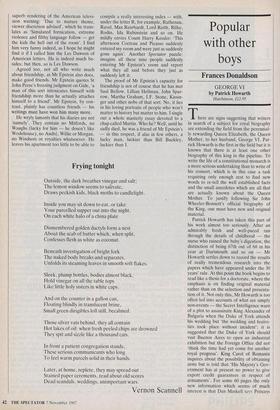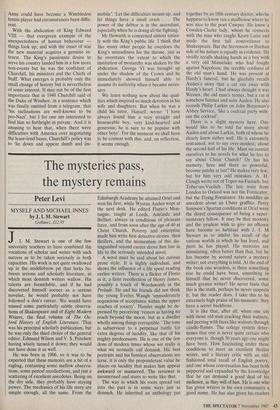Popular with other boys
Frances Donaldson
GEORGE VI by Patrick Howarth Hutchinson, f12.95 There here are signs suggesting that writers in search of a subject for royal biography are extending the field from the perennial- ly rewarding Queen Elizabeth, the Queen Mother, to her husband, George VI. Pat- rick Howarth is the first in the field but it is known that there is at least one other biography of this king in the pipeline. To write the life of a constitutional monarch is a more serious undertaking than to write of his consort, which is in this case a task requiring only enough zest to find new words to re-tell the well established facts and the small anecdotes which are all that are actually known about the Queen Mother. To justify following Sir John Wheeler-Bennett's official biography of the King, one must have new and original material.
Patrick Howarth has taken this part of his work almost too seriously. After an admirably fresh and well-paced run through the details of childhood — the nurse who ruined the baby's digestion, the distinction of being 67th out of 68 in his year at Dartmouth and so on — Mr Howarth settles down to record the results of really tremendous research into the papers which have appeared under the 30 years' rule. At this point the book begins to read like a thesis for a doctorate, where the emphasis is on finding original material rather than on the selection and presenta- tion of it. Not only this, Mr Howarth is too often led into accounts of what are simply non-events — the Secret Intelligence warn of a plot to assassinate King Alexander of Bulgaria when the Duke of York attends his wedding but 'the wedding and festivi- ties took place without incident': it is suggested that the Duke of York should visit Buenos Aires to open an industrial exhibition but the Foreign Office did not 'think the time had yet come for another royal progress'. King Carol of Romania inquires about the possibility of obtaining arms but is told that 'His Majesty's Gov- ernment has at present no power to give export credit guarantees in respect of armaments'. For some 60 pages the only new information which seems of much interest is that Dan Maskell says Princess Anne could have become a Wimbledon tennis player had circumstances been diffe- rent.
With the abdication of King Edward VIII — that evergreen example of the unexpectedness of human behaviour things look up; and with the onset of war the new material acquires a genuine in- terest. The King's passionate desire to serve his country landed him in a few more non-events but he was the confidant of Churchill, his ministers and the Chiefs of Staff. What emerges is probably only the small change of history but is nevertheless of some interest. It may not be of the first importance that in 1940 Churchill said of the Duke of Windsor, in a sentence which was finally omitted from a telegram, that `his inclinations are well-known to be pro-Nazi', but I for one am interested to find him so forthright in private. And it is amusing to hear that, when there were difficulties with America over negotiating the lease-lend bases, Churchill's policy was to lie down and appear dumb and im- mobile'. 'Let the difficulties mount up, and let things have a small crash . . . The power of the debtor is in the ascendant, especially when he is doing all the fighting.'
Mr Howarth is concerned almost entire- ly with the King's public life. I think that like many other people he overdoes the King's unreadiness for the throne, just as he overstates the extent to which the institution of monarchy was shaken by the abdication. George VI was brought up under the shadow of the Crown and he immediately showed himself able to assume its authority when ft became neces- sary.
We learn nothing new about the qual- ities which inspired so much devotion in his wife and daughters. But when he was a child his tutor, Hansell, wrote: 'I have always found him a very straight and honourable boy, very kind-hearted and generous; he is sure to be popular with other boys'. For the moment we shall have to be content with this, and, on reflection, it seems enough.



































































 Previous page
Previous page